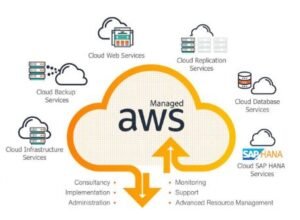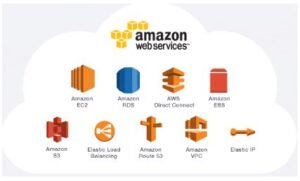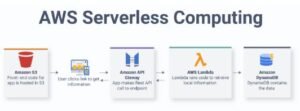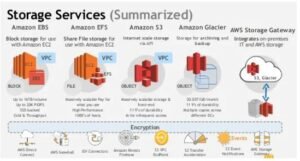What is AWS?
Amazon Web Services (AWS) is a comprehensive and widely adopted cloud computing platform offered by Amazon. It provides a vast array of cloud services, including computing power, storage, databases, machine learning, analytics, networking, mobile, developer tools, and security, among others. AWS enables businesses and developers to build, deploy, and manage applications and services through a global network of data centers.

AWS and its Components:

Key Features of AWS:
- Computing Power

- EC2 (Elastic Compute Cloud): Provides resizable virtual servers (instances) in the cloud, allowing users to scale computing capacity up or down as needed.
- Lambda: A serverless compute service that automatically runs code in response to events and scales with the size of the workload.
- Storage Solutions

- S3 (Simple Storage Service): Scalable object storage service for data storage and retrieval.
- EBS (Elastic Block Store): Block storage volumes for use with EC2 instances, providing persistent storage.
- Glacier: Low-cost cloud storage service for data archiving and long-term backup.
- Databases

- RDS (Relational Database Service): Managed relational database service supporting multiple database engines, such as MySQL, PostgreSQL, and Oracle.
- DynamoDB: Fully managed NoSQL database service.
- Redshift: Fast, scalable data warehouse service.
4. Networking

- VPC (Virtual Private Cloud): Allows users to create isolated networks within the AWS cloud.
- Route 53: Scalable domain name system (DNS) web service.
- Direct Connect: Establishes dedicated network connections from on-premises data centers to AWS.
- Machine Learning and AI

- SageMaker: A fully managed service for building, training, and deploying machine learning models.
- Rekognition: Image and video analysis service.
- Lex: Service for building conversational interfaces using voice and text.
- Analytics

- EMR (Elastic MapReduce): Managed Hadoop framework for processing large datasets.
- Kinesis: Real-time data processing and analytics.
- Athena: Interactive query service to analyze data in S3 using standard SQL.
- Developer Tools

- CodeCommit: Secure, scalable, managed source control service.
- CodeBuild: Fully managed build service.
- CodeDeploy: Automates code deployments to any instance, including EC2 instances and on-premises servers.
- Security and Compliance

- IAM (Identity and Access Management): Controls access to AWS services and resources.
- KMS (Key Management Service): Manages cryptographic keys for data encryption.
- GuardDuty: Threat detection service that continuously monitors for malicious activity.
Benefits of AWS:
- Scalability: Easily scales up or down to meet demand, ensuring optimal resource usage and cost-efficiency.
- Flexibility: Supports a wide range of operating systems, programming languages, databases, and other services.
- Cost-Effectiveness: Pay-as-you-go pricing model with no upfront costs, making it accessible for businesses of all sizes.
- Global Reach: Operates in multiple geographic regions and availability zones, ensuring low latency and high availability.
- Security: Robust security measures, including data encryption, access control, and compliance certifications.
Common Use Cases:
- Web Hosting: Hosting websites and web applications.
- Data Backup and Recovery: Storing and archiving data with easy retrieval.
- Big Data Analytics: Processing and analyzing large datasets.
- Machine Learning: Building, training, and deploying machine learning models.
- Content Delivery: Distributing content globally with low latency.
- IoT (Internet of Things): Managing IoT devices and analyzing IoT data.
Summary
Amazon Web Services (AWS) is a leading cloud computing platform that offers a wide range of services to help businesses and developers build, deploy, and manage applications and services efficiently and securely. Its flexibility, scalability, and cost-effectiveness make it a popular choice for organizations of all sizes, enabling them to leverage the power of the cloud for various use cases, from simple web hosting to advanced machine learning applications.
![]()


